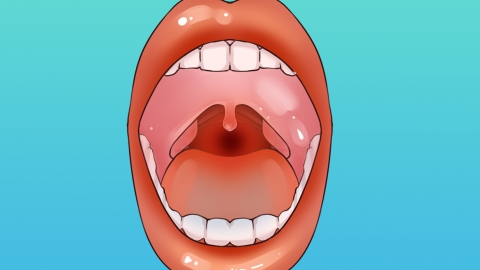What should I do if a toddler has phlegm in the throat causing a wheezing sound?
Generally speaking, the throat refers to the pharynx. A baby's pharynx producing gurgling sounds may be caused by underdeveloped swallowing function, dry environment, common cold, bronchitis, pneumonia, or other reasons. It is recommended to seek timely medical attention and adopt general treatment, medication, and other treatment methods under a doctor's guidance. Detailed explanations are as follows:

1. Underdeveloped Swallowing Function
Infants are young, and their swallowing reflex has not fully matured yet. Saliva secreted in the mouth and throat cannot be swallowed smoothly and timely, accumulating in the throat, which may cause gurgling sounds during breathing. As the infant grows, swallowing function will gradually improve. During this period, parents can appropriately guide the infant to practice swallowing, such as encouraging the infant to chew slowly and improve the coordination of swallowing movements while eating.
2. Dry Environment
An infant's respiratory mucosa is delicate and sensitive. When the surrounding air is dry, moisture from the respiratory mucosa easily evaporates, causing secretions to become thick and accumulate in the throat. When air flows through the phlegm during respiration, it produces gurgling sounds. A humidifier can be used to adjust indoor humidity, and it is important to ensure the infant consumes sufficient water daily.
3. Common Cold
Common colds are usually caused by viral infections, such as rhinovirus, influenza virus, etc. Infants have relatively weak immunity and are prone to infection after exposure to viruses. This can cause mucosal congestion and edema in areas such as the nasal cavity and throat, with increased and thicker secretions, leading to the above symptoms. Nasal congestion and runny nose might also occur. Under a doctor's guidance, medications such as Pediatric Paracetamol, Chlorpheniramine, and Artificial Cow-bezoar for Kids, Blue芩 Oral Liquid, and other drugs can be used for treatment.
4. Bronchitis
Bronchitis is often caused by viral or bacterial infections, and environmental factors such as cold air and air pollution, as well as low immunity in infants, can also trigger it. When the bronchi become inflamed, the goblet cells and mucus glands in the bronchial mucosa proliferate and hypertrophy, secreting large amounts of mucus that may accumulate in the throat, causing gurgling sounds during breathing. Fever and wheezing may also occur. It is necessary to follow medical advice to use medications such as Azithromycin for oral suspension, Ambroxol and Clenbuterol Oral Solution, Paracetamol Suspension Drops, and others for treatment.
5. Pneumonia
Pneumonia may be caused by pathogens such as bacteria, viruses, or mycoplasma. Under the stimulation of inflammation, secretions may increase, and phlegm may accumulate in the throat, resulting in gurgling sounds. It is often accompanied by symptoms such as difficulty breathing and chest pain. Under a doctor's recommendation, medications such as Azithromycin for oral suspension, Pediatric Lung-Heat Cough and Asthma Oral Liquid, Ambroxol Hydrochloride Injection, and others can be used for treatment.
In daily life, it is important to strengthen the infant's daily care, adjust clothing according to weather changes to avoid catching a chill; ensure indoor air is fresh and well-circulated by regularly opening windows for ventilation.




